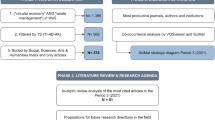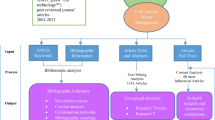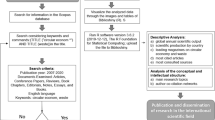Abstract
Solid waste generation has been significantly accelerated by the rapid growth of economy and population worldwide. The traditional waste management focusing on waste utilization and disposal is unable to unravel the continuous depletion of finite natural resources. “Zero waste” as an integrated waste management method to promote waste reduction through a pack of strategies such as cleaner production and green consumption has emerged. Here, we systematically reviewed the researches on zero waste from a scientometric perspective, and visually unveiled the most productive countries, evolution process, main authors, major research areas, and documents of zero waste research domain. The results show that with increased publications, zero waste has become a multidisciplinary study area and food waste reduction is the biggest sub-network in zero waste research. The current research frontiers are mainly regarding “lean production,” “consumer behavior,” “productivity.” Accordingly, this study proposed a pathway for realizing zero waste cities with three lanes: (1) research and development, (2) management method, and (3) policy and implementation. The findings are also expected to be beneficial to latecomer researches in the waste management field.
Highlights
-
A comprehensive scientometric analysis and visualization on zero waste were innovatively studied.
-
The development vein of the zero waste was summarized; the characteristics and trends were analyzed.
-
Three research areas—“lean production,” “consumer behavior,” and “productivity”—are the current research frontiers.
-
Food waste reduction is the biggest sub-network, representing the highest research attention.
-
A holistic strategy for realizing the construction of zero waste cities is proposed.







Similar content being viewed by others
Data Availability
All data generated or analyzed during this study are included in this published article [and its supplementary information files].
Abbreviations
- ZW:
-
Zero waste
- MSW:
-
Municipal solid waste
- ISLR:
-
Integrated systematic literature review
- R&D:
-
Research and development
References
Aschemann-Witzel J, de Hooge IE, Amani P et al (2015) Consumer-related food waste: causes and potential for action. Sustainability 7:6457–6477. https://doi.org/10.3390/su7066457
Beretta C, Stoessel F, Baier U, Hellweg S (2013) Quantifying food losses and the potential for reduction in Switzerland. Waste Manage 33:764–773. https://doi.org/10.1016/j.wasman.2012.11.007
Betz A, Buchli J, Göbel C, Müller C (2015) Food waste in the Swiss food service industry – Magnitude and potential for reduction. Waste Manage 35:218–226. https://doi.org/10.1016/j.wasman.2014.09.015
Binnemans K, Jones PT, Blanpain B et al (2015) Towards zero-waste valorisation of rare-earth-containing industrial process residues: a critical review. J Clean Prod 99:17–38. https://doi.org/10.1016/j.jclepro.2015.02.089
Boyle CA (2000) Solid waste management in New Zealand. Waste Manage 20:517–526. https://doi.org/10.1016/S0956-053X(00)00023-4
C40 Cities (2018) C40 : Zero Waste Declaration. https://www.c40.org/other/zero-waste-declaration. Accessed 12 Mar 2021
Chen C (2017) Science mapping: a systematic review of the literature. J Data Inf Sci 2:1. https://doi.org/10.1515/jdis-2017-0006
Chen C (2014) The citespace manual. In: Scientometrics. http://cluster.ischool.drexel.edu/~cchen/citespace/CiteSpaceManual.pdf. Accessed 12 Mar 2021.
Chen C, Hu Z, Liu S, Tseng H (2012) Emerging trends in regenerative medicine: a scientometric analysis in CiteSpace. Expert Opin Biol Ther 12:593–608. https://doi.org/10.1517/14712598.2012.674507
Cole C, Osmani M, Quddus M et al (2014) Towards a zero waste strategy for an English local authority. Resour Conserv Recycl 89:64–75. https://doi.org/10.1016/j.resconrec.2014.05.005
Connett P (2006) Zero Waste Wins Altern J 32:14–15
Eheliyagoda D, Wei F, Shan G et al (2019) Examining the temporal demand and sustainability of copper in China. Environ Sci Technol 53:13812–13821. https://doi.org/10.1021/acs.est.9b03875
European Commission (2014) Towards a circular economy – a zero waste programme for Europe. https://ec.europa.eu/environment/ecoap/news/new-communication-published-today-towards-circular-economy-zero-waste-programme-europe_en. Accessed 8 Nov 2021
Gentil EC, Gallo D, Christensen TH (2011) Environmental evaluation of municipal waste prevention. Waste Manage 31:2371–2379. https://doi.org/10.1016/j.wasman.2011.07.030
Ghisellini P, Cialani C, Ulgiati S (2016) A review on circular economy: the expected transition to a balanced interplay of environmental and economic systems. J Clean Prod 114:11–32. https://doi.org/10.1016/j.jclepro.2015.09.007
Gustavsson J, Cederberg C, Sonesson U (2011) Global Food Losses and Food Waste. In: Study conducted for the International Congress “Save Food!” at Interpack2011, Düsseldorf, Germany, Food and Agriculture Organization of the UN
Hoornweg D, Bhada-Tata P, Kennedy C (2013) Environment: waste production must peak this century. Nat News (sunr Fla) 502:615. https://doi.org/10.1038/502615a
Junior M, Filho M (2012) Production planning and control for remanufacturing: Literature review and analysis. Production planning & control. Prod Plan Control 23:419–435. https://doi.org/10.1080/09537287.2011.561815
Kaza S, Yao L, Bhada-Tata P, Woerden FV (2018) What a Waste 2.0: A Global Snapshot of Solid Waste Management to 2050. World Bank Publications
Kerdlap P, Low JSC, Ramakrishna S (2019) Zero waste manufacturing: a framework and review of technology, research, and implementation barriers for enabling a circular economy transition in Singapore. Resour Conserv Recycl 151:104438. https://doi.org/10.1016/j.resconrec.2019.104438
Kleinberg J (2002) Bursty and Hierarchical Structure in Streams. Canada, Edmonton, Alberta, p 25
Koshelev V, Klimova L, Starikov V, Nizova S (2000) New demulsifiers for petroleum preparation processes. Chem Tech Fuels Oils 36:97–100. https://doi.org/10.1007/BF02725257
Lebersorger S, Schneider F (2011) Discussion on the methodology for determining food waste in household waste composition studies. Waste Manage 31:1924–1933. https://doi.org/10.1016/j.wasman.2011.05.023
Mao G, Liu X, Du H et al (2015) Way forward for alternative energy research: a bibliometric analysis during 1994–2013. Renew Sust Energ Rev 48:276–286
MEE (2019) Work Plan on “Zero-waste City” Pilot Program in China. http://mee.gov.cn/home/ztbd/2020/wfcsjssdgz/dcsj/wfcszcwj/201906/P020190606505202335490.pdf. Accessed 12 Mar 2021
MEWR, NEA (2019) Zero Waste Masterplan Singapore. https://www.towardszerowaste.gov.sg/. Accessed 12 Mar 2021
MOE (2018) Fundamental plan for establishing a sound material-cycle society. https://www.env.go.jp/en/recycle/smcs/index.html. Accessed 12 Mar 2021
Papargyropoulou E, Wright N, Lozano R et al (2016) Conceptual framework for the study of food waste generation and prevention in the hospitality sector. Waste Manage 49:326–336. https://doi.org/10.1016/j.wasman.2016.01.017
Parfitt J, Barthel M, Macnaughton S (2010) Food waste within food supply chains: quantification and potential for change to 2050. Philos Trans R Soc Lond, b, Biol Sci 365:3065–3081. https://doi.org/10.1098/rstb.2010.0126
Phillips PS, Tudor T, Bird H, Bates M (2011) A critical review of a key Waste Strategy Initiative in England: Zero Waste Places Projects 2008–2009. Resour Conserv Recycl 55:335–343. https://doi.org/10.1016/j.resconrec.2010.10.006
Pietzsch N, Ribeiro JLD, de Medeiros JF (2017) Benefits, challenges and critical factors of success for Zero Waste: a systematic literature review. Waste Manage 67:324–353. https://doi.org/10.1016/j.wasman.2017.05.004
Price DDS (1976) A general theory of bibliometric and other cumulative advantage processes. J Am Soc Inf Sci 27:292–306
Pritchard A (1969) Statistical Bibliography or Bibliometrics? J Doc 25:348–349
Quested TE, Marsh E, Stunell D, Parry AD (2013) Spaghetti soup: The complex world of food waste behaviours. Resour Conserv Recycl 79:43–51. https://doi.org/10.1016/j.resconrec.2013.04.011
Sanguino R, Barroso A, Fernández-Rodríguez S, Sánchez-Hernández MI (2020) Current trends in economy, sustainable development, and energy: a circular economy view. Environ Sci Pollut Res 27:1–7. https://doi.org/10.1007/s11356-019-07074-x
Scialabba N, Jan O, Tostivint C et al (2013) Food Wastage Footprint: Impacts on Natural Resources. Rome, Italy, Summary Report Natural Resources Management and Environment Department
Secondi L, Principato L, Laureti T (2015) Household food waste behaviour in EU-27 countries: A multilevel analysis. Food Policy 56:25–40. https://doi.org/10.1016/j.foodpol.2015.07.007
SF Environment (2003) Policies Related to Zero Waste. https://sfenvironment.org/zero-waste-legislation. Accessed 12 Mar 2021
Singh S, Ramakrishna S, Gupta MK (2017) Towards zero waste manufacturing: a multidisciplinary review. J Clean Prod 168:1230–1243. https://doi.org/10.1016/j.jclepro.2017.09.108
Small H (1973) Co-citation in the scientific literature: a new measure of the relationship between two documents. J Am Soc Inf Sci 24:265–269. https://doi.org/10.1002/asi.4630240406
Snyman J, Vorster K (2011) Towards zero waste: a case study in the City of Tshwane. Waste Manag Res 29:512–520. https://doi.org/10.1177/0734242X10382947
Song Q, Li J, Zeng X (2015) Minimizing the increasing solid waste through zero waste strategy. J Clean Prod 104:199–210. https://doi.org/10.1016/j.jclepro.2014.08.027
Stanescu MD (2021) State of the art of post-consumer textile waste upcycling to reach the zero waste milestone. Environ Sci Pollut Res 28:14253–14270. https://doi.org/10.1007/s11356-021-12416-9
Stefan V, van Herpen E, Tudoran AA, Lähteenmäki L (2013) Avoiding food waste by Romanian consumers: the importance of planning and shopping routines. Food Qual Prefer 28:375–381. https://doi.org/10.1016/j.foodqual.2012.11.001
Tan Q, Li J, Boljkovac C (2018) Responding to China’s waste import ban through a new, innovative, cooperative mechanism. Environ Sci Technol 52:7595–7597. https://doi.org/10.1021/acs.est.8b01852
UNEA 4 (n.d.) Ministerial declaration of the United Nations Environment Assembly at its fourth session. Innovative solutions for environmental challenges and sustainable consumption and production. https://www.unep.org/environmentassembly/unea4. Accessed 12 Mar 2021
Wang J, Li Z, Tam V (2014) Critical factors in effective construction waste minimization at the design stage: a Shenzhen case study, China. Resour Conserv Recycl 82:1–7. https://doi.org/10.1016/j.resconrec.2013.11.003
Xevgenos D, Papadaskalopoulou C, Panaretou V et al (2015) Success stories for recycling of MSW at municipal level: a review. Waste Biomass Valorization. https://doi.org/10.1007/S12649-015-9389-9
Yang W-S, Park J-K, Park S-W, Seo Y-C (2014) Past, present and future of waste management in Korea. J Mater Cycles Waste Manag 17 https://doi.org/10.1007/s10163-014-0301-7
Yu D (2017) Mapping research on carbon emissions trading: a co-citation analysis. Renew Sust Energ Rev 9. https://doi.org/10.1016/j.rser.2016.11.144
Zaman AU (2015) A comprehensive review of the development of zero waste management: lessons learned and guidelines. J Clean Prod 91:12–25. https://doi.org/10.1016/j.jclepro.2014.12.013
Zaman AU (2014a) Measuring waste management performance using the ‘Zero Waste Index’: the case of Adelaide, Australia. J Clean Prod 66:407–419. https://doi.org/10.1016/j.jclepro.2013.10.032
Zaman AU (2014b) Identification of key assessment indicators of the zero waste management systems. Ecol Indic 36:682–693. https://doi.org/10.1016/j.ecolind.2013.09.024
Zaman AU, Lehmann S (2013) The zero waste index: a performance measurement tool for waste management systems in a ‘zero waste city.’ J Clean Prod 50:123–132. https://doi.org/10.1016/j.jclepro.2012.11.041
Zeng X, Li J (2021) Emerging anthropogenic circularity science: principles, practices, and challenges. iScience 102237. https://doi.org/10.1016/j.isci.2021.102237
ZERI (2013) Zero Emissions Research and Initiatives. http://www.zeri.org/ZERI/About_ZERI.html. Accessed 9 Mar 2021
Zhang L, Zhong Y, Geng Y (2019) A bibliometric and visual study on urban mining. J Clean Prod 239:118067. https://doi.org/10.1016/j.jclepro.2019.118067
ZWIA (2009) Zero Waste Definition. In: Zero Waste International Alliance. http://zwia.org/zero-waste-definition. Accessed 4 Mar 2021
Funding
This research is supported by the National Key R&D Program of China (2019YFC1908504), the major project of “The Beijing Social Science Fund” (17ZDA27), and the Tsinghua University Initiative Scientific Research Program (2016THZWYX12).
Author information
Authors and Affiliations
Contributions
Shang Zhang: writing—original draft; conceptualization; methodology; visualization; Quanyin Tan: conceptualization; supervision; Guochang Xu: investigation; writing—review and editing; Jinhui Li: data curation; resources; supervision; project administration; funding acquisition.
Corresponding author
Ethics declarations
Ethics approval
Not applicable.
Consent to participate
Not applicable.
Consent for publication
Not applicable.
Competing interests
The authors declare no competing interests.
Additional information
Responsible Editor: Philippe Garrigues
Publisher's note
Springer Nature remains neutral with regard to jurisdictional claims in published maps and institutional affiliations.
Supplementary Information
Below is the link to the electronic supplementary material.
Rights and permissions
About this article
Cite this article
Zhang, S., Tan, Q., Xu, G. et al. Unveiling characteristics and trend of zero waste research: a scientometric perspective. Environ Sci Pollut Res 29, 44391–44403 (2022). https://doi.org/10.1007/s11356-021-18048-3
Received:
Accepted:
Published:
Issue Date:
DOI: https://doi.org/10.1007/s11356-021-18048-3




